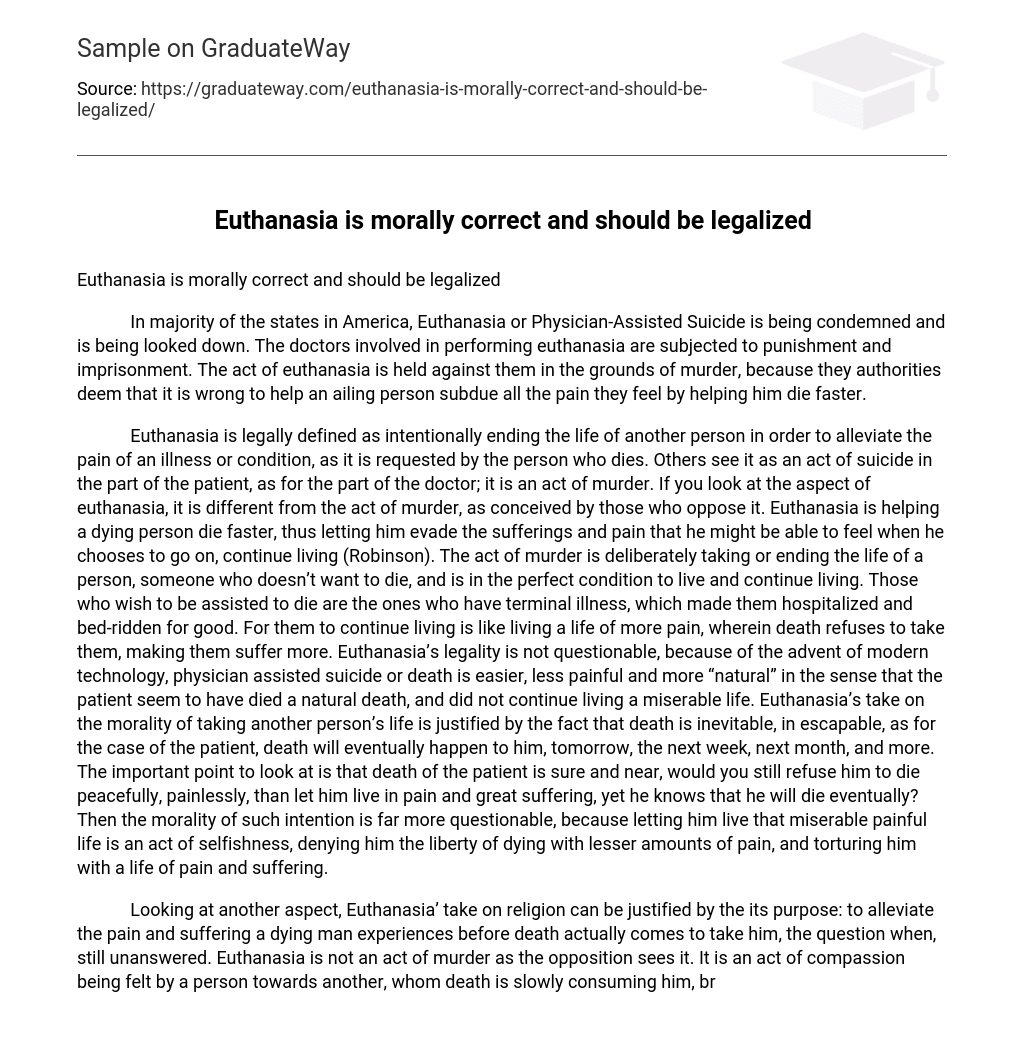In majority of the states in America, Euthanasia or Physician-Assisted Suicide is being condemned and is being looked down. The doctors involved in performing euthanasia are subjected to punishment and imprisonment. The act of euthanasia is held against them in the grounds of murder, because they authorities deem that it is wrong to help an ailing person subdue all the pain they feel by helping him die faster.
Euthanasia is legally defined as intentionally ending the life of another person in order to alleviate the pain of an illness or condition, as it is requested by the person who dies. Others see it as an act of suicide in the part of the patient, as for the part of the doctor; it is an act of murder. If you look at the aspect of euthanasia, it is different from the act of murder, as conceived by those who oppose it. Euthanasia is helping a dying person die faster, thus letting him evade the sufferings and pain that he might be able to feel when he chooses to go on, continue living (Robinson). The act of murder is deliberately taking or ending the life of a person, someone who doesn’t want to die, and is in the perfect condition to live and continue living. Those who wish to be assisted to die are the ones who have terminal illness, which made them hospitalized and bed-ridden for good. For them to continue living is like living a life of more pain, wherein death refuses to take them, making them suffer more. Euthanasia’s legality is not questionable, because of the advent of modern technology, physician assisted suicide or death is easier, less painful and more “natural” in the sense that the patient seem to have died a natural death, and did not continue living a miserable life. Euthanasia’s take on the morality of taking another person’s life is justified by the fact that death is inevitable, in escapable, as for the case of the patient, death will eventually happen to him, tomorrow, the next week, next month, and more. The important point to look at is that death of the patient is sure and near, would you still refuse him to die peacefully, painlessly, than let him live in pain and great suffering, yet he knows that he will die eventually? Then the morality of such intention is far more questionable, because letting him live that miserable painful life is an act of selfishness, denying him the liberty of dying with lesser amounts of pain, and torturing him with a life of pain and suffering.
Looking at another aspect, Euthanasia’ take on religion can be justified by the its purpose: to alleviate the pain and suffering a dying man experiences before death actually comes to take him, the question when, still unanswered. Euthanasia is not an act of murder as the opposition sees it. It is an act of compassion being felt by a person towards another, whom death is slowly consuming him, bringing him pain and suffering. Would it be right to let a fellow man, a person just like us, suffer from pain and thoughts of dying, without actually being able to do anything to avoid it. Would you, as a person pf God, let a man continually be tortured by the harshness of his condition, say a would, or a disease without any cure, and is slowly taking up the body, the thoughts of your body rotting, yet you are still breathing, being able to feel every pain that it gives you (Gula).
Summary
Living a life of excessive chronic pain is the issue that you have to consider with Euthanasia. If you really think about the pains and the sufferings of those who seek euthanasia, would you ever consider yourself being in that position, where the thought of death gives them hope. Hoping that they would die, in order to end all the pain and suffering they are feeling because they weren’t able to die a fast death. No one can stand such suffering, such torture, thus, death is a gift that you can give them to end their pains.
References:
Gula, Richard M. “Dying Well: A Challenge to Christian Compassion”. 1999. February 7 2007. <http://www.religion-online.org/showarticle.asp?title=548>.
Robinson, B.A. “Euthanasia and Physician Assisted Suicide”. 2001. February 7 2007. <http://www.religioustolerance.org/euth1.htm>.





